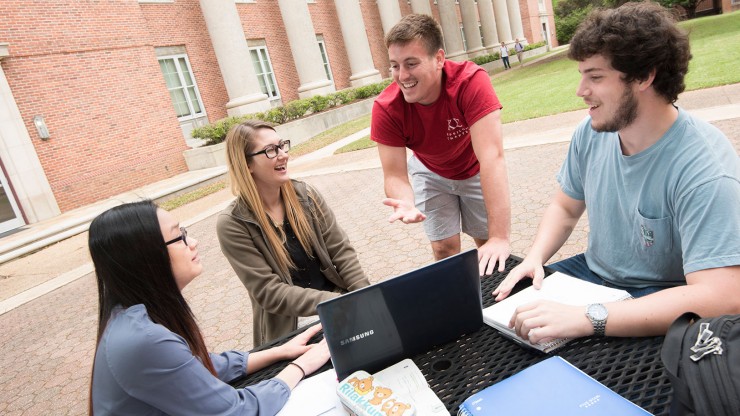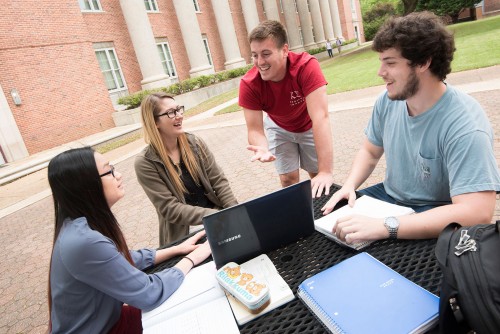Overview
Many of our students go on to graduate study in psychology and a major factor in graduate admissions is demonstrated skill in designing and conducting original scientific research. Psychology students at Centenary have the opportunity to participate in research in their courses, as a collaborator in ongoing faculty research projects, and through an Independent Study Honors Project.
Psychology majors will design research studies, collect data, prepare analyses, and present their work in oral and/or written forms in the classwork for Research Methods, Psychology of Design, Brain & Language, Senior Seminar, and other psychology classes. In these structured experiences, students will complete an entire research project in a single semester, producing a high-quality study that could be the first step to a collaborative or independent project.
Centenary psychology faculty members have ongoing research projects with opportunities for student collaboration. Student research assistants help to plan studies, collect data, run statistical analyses, and prepare posters and papers.
Students who want to embark on an in-depth research project in their area of interest can complete an Independent Study Honors Thesis. This project will begin in the second semester of the student’s junior year with a planning process to design a project and set up an Independent Study (and Honors committee if necessary). The student will write a literature review and collect data in their senior year, resulting in a senior thesis paper reporting their literature review and research findings.
Faculty Research
Dr. Alexander is currently engaged in speech perception projects examining perceptual learning and memory for accented speech, acoustical analyses and perceptual ratings of vocal fry, and acoustical correlates of intelligibility and accentedness in English across first language groups. She is also interested in working on questions of the role of auditory imagery of spoken language in reading, sound symbolism and cross-modal mappings of speech sounds, and other questions of how the sounds of language interact with the communicative message.
Dr. Hammond is working on research projects examining the cognitive and emotional development of college-age populations, especially with regards to the college environment. Her current projects examine how immersive experiences (such as May intercultural immersion classes) may affect student development, how students benefit from other kinds of class-related experiences and service-learning, and how development relates to issues of academic dishonesty.
Dr. Zunick has several ongoing research projects. In one project, he uses a writing intervention to encourage people to revise their self-beliefs upward following a success. In another, he uses a visual judgment task to produce visual estimates of how people view their own faces, and then examines what factors bias those images. And in a third project, he explores how people’s attitudes toward various topics (e.g., political issues, products, other people) are tied to their self-concepts and identities, and what the consequences of this self-attitude connection might be.
Recent Student Projects
Sarah Irons ‘16
In her senior year, Sarah Irons investigated vocal fry (or creaky voicing) and how common it is in the speech of young men and women as they performed a variety of speaking tasks. She found that vocal fry was more prevalent in young men’s speech, but that the prevalence differed across task types. Sarah and Dr. Alexander are currently working on two follow-up studies investigating listener perceptions of speech with vocal fry. This project will be presented at the 5th Joint Meeting of the Acoustical Society of America and the Acoustical Society of Japan in Honolulu, Hawaii in December 2016.
Gabrielle Glorioso ‘16
 The idea for Gabrielle Glorioso’s project emerged out of work she had done for an in-class project in Research Methods on in- and out-group perceptions of race. In her junior year, she explored the role of race and dialect on perceived aggression using auditory stimuli. She found that listeners perceived stereotypically black-associated stimuli as more aggressive and less warm than stereotypically white-associated stimuli. She presented this project at the University of Louisiana at Lafayette 9th Annual Undergraduate Research Invitational.
The idea for Gabrielle Glorioso’s project emerged out of work she had done for an in-class project in Research Methods on in- and out-group perceptions of race. In her junior year, she explored the role of race and dialect on perceived aggression using auditory stimuli. She found that listeners perceived stereotypically black-associated stimuli as more aggressive and less warm than stereotypically white-associated stimuli. She presented this project at the University of Louisiana at Lafayette 9th Annual Undergraduate Research Invitational.
Lauren Marlar ‘15
 For her independent study project, Lauren Marlar completed a qualitative research project in which she conducted several focus groups with board and community members to better understand their needs and their understanding of the role of a human service non-profit agency in their community. She examined the ways in which low-income minority community members are not represented or invited to participate in decision-making for the organization. She found that clients and administrators shared similar topical concerns and priorities for the community, including but not limited to employment, child welfare, and safety. However, each group conceptualized these problems in ways congruent with their differing perspectives. Lauren presented this research as a poster at the 61st Meeting of the Southwestern Psychological Association in Wichita, Kansas.
For her independent study project, Lauren Marlar completed a qualitative research project in which she conducted several focus groups with board and community members to better understand their needs and their understanding of the role of a human service non-profit agency in their community. She examined the ways in which low-income minority community members are not represented or invited to participate in decision-making for the organization. She found that clients and administrators shared similar topical concerns and priorities for the community, including but not limited to employment, child welfare, and safety. However, each group conceptualized these problems in ways congruent with their differing perspectives. Lauren presented this research as a poster at the 61st Meeting of the Southwestern Psychological Association in Wichita, Kansas.




